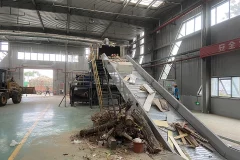
Introduction:Effective waste management is crucial for maintaining a sustainable environment. In this article, we will explore an optimized waste disposal process that incorporates the use of advanced equipment: the double-shaft shredder, magnetic separator, trommel screen, single-shaft shredder, and air separator. These devices work in synergy to maximize the recycling potential of various types of solid waste, contributing to a cleaner and greener future.Double-Shaft Shredder:The double-shaft shredder is a versatile machine designed to handle a wide range of waste materials, including household waste. Equipped with two counter-rotating shafts and numerous sturdy cutting blades, it effectively reduces solid waste into smaller, uniform particles. This shredder ensures efficient material breakdown, facilitating subsequent sorting and recycling processes.Magnetic Separator:Following the double-shaft shredding process, the waste stream then enters the magnetic separator. This equipment utilizes powerful magnets
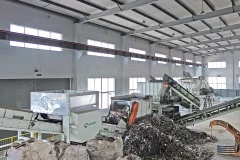
Solid Waste Disposal System by GEP Helps Cement Kiln Reduce Costs and Increase Efficiency
2023-12-24GEP ECOTECH has always been committed to the treatment of various solid waste, and has rich experience in operating projects in the preparation of alternative fuels for cement kilns. It can provide professional solutions and high-performance equipment for the green transformation of cement enterprises.1. Cement kiln collaborative disposal of solid waste technologyCement kiln collaborative disposal of solid waste technology uses solid waste to replace some raw materials or fuels, enabling cement production enterprises to save on raw material demand, reduce energy consumption, and achieve complete resource utilization. At the same time, the carbon dioxide released by the decomposition of calcium carbonate is reduced, saving on the occupation of waste landfills. It meets the requirements of energy conservation, consumption reduction, and emission reduction, and has significant economic and environmental benefits.2. What are the sources of alternative fuels for cement kilns?Alternative fuels refer to fuels that
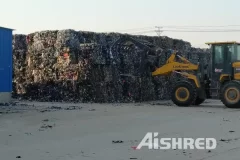
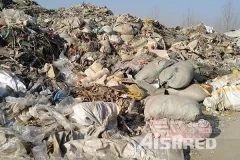
Through designing innovative technologies to dispose of urban domestic waste, developing customized domestic waste solutions, obtaining new value from waste through domestic waste disposal production lines, turning waste into resources and giving new life to waste. This is the mission that AIShred has been pursuing for many years. Over the years, AIShred has never stopped research and development, achieved multiple goals and developed innovative solutions that can dispose of a variety of domestic waste. Our domestic waste disposal production lines have been put into operation in a number of projects, and have been unanimously recognized by customers both at home and abroad. At the beginning of June this year, a resource recycling company in Pakistan finally decided to cooperate with us to purchase a set of domestic waste disposal production line equipment with a processing capacity of 200 tons per month after a year of market research and comparison, which is currently in production. Introduction to Domestic
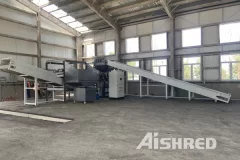
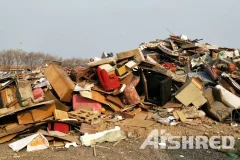
Bulky waste refers to waste furniture and other domestic wastes that are generated in daily life or activities providing services for daily life, weigh more than 5kg, have a volume of more than 0.2m3 or have a length of more than 1m, and have strong integrity and need to be disassembled. For example: waste bed frame, mattress, sofa, table, chair, wardrobe, bookcase, waste household appliances, kitchen appliances, sanitary appliances and other large items. Recently, an Australian furniture manufacturer finally purchased a complete set of bulky waste disposal plant from AIShred after comparison with many other manufacturers. Bulky Waste Disposal SystemThe bulky waste disposal system is mainly composed of metal chain conveyor, double shaft shear crusher, iron remover, dust reduction system, intelligent control system, etc. The equipment configuration and model of bulky waste disposal production line are mainly based on the output and discharge size requirements of customers. First, the bulky waste is manually

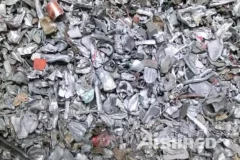
Automobile Shredder Residue(ASR) Recycling
2022-05-09Auto shredder residue (ASR), also referred to as auto shredder fluff, shedder light fraction (SLF), residues from shredding (RESH) or simply “auto fluff” of “fluff”, is the fraction of an shredded end-of-life vehicle (ELV). In the past, it was landfilled. Now, They can now be sorted and recycled thanks to AIShred's sorting and shredding technology. It can prevent this useful and valuable material from taking up the dwindling space in landfills and contribute to a cleaner, safer environment. How ASR Produced?A discarded car is first partially dismantled. All liquids (oils, antifreeze, fuel, etc.) are removed from it. Batteries, tires and catalytic converters are also removed and sent for further processing. Depending on demand, other good parts can be dismantled and sold for use as spare parts. On average, about 10% of the car's weight is pre-dismantled. In a shredder, a car body is shattered into pieces the size of a fist. 70-75% of the various metals from the body are sorted and sold to smelters and
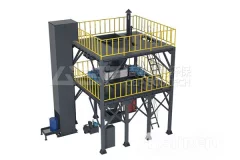

What is Hazardous Waste Disposal Equipment?
2022-05-02Hazardous waste is toxic, harmful, volatile and other wastes that cause serious harm to human body, such as chemical drums, the internal residual chemical liquid, etc. For the disposal of this type of material, we must first ensure the safety of disposal, and today we lead you to understand our JEP's hazardous waste disposal equipment. AIShred shredder in safety protection is divided into two ways: shredding system safety protection is divided into: (1), passive (carbon dioxide or dry powder, steam) fire extinguishing, that is, in the shredding process after the fire triggers the induction system alarm at the same time to open the fire extinguishing system; (2), active: at present mainly nitrogen protection, that is, before the shredder starts, the shredding system is injected with nitrogen, when the oxygen content in the shredding area is below a certain value, the shredding system starts to work. An online oxygen monitoring system is used to analyse and monitor the oxygen content of the shredding area. The


